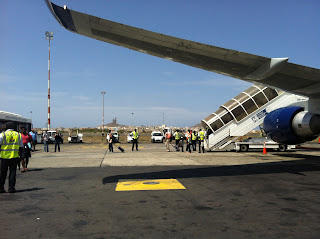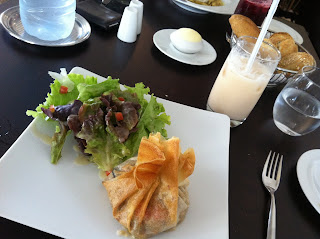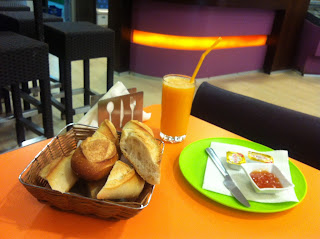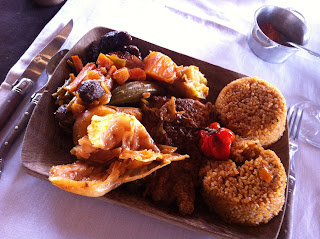While I am relieved to be returning to the US, and do need a break from this work, I am sad that this is my last trip to Senegal. I have come to enjoy Dakar, and probably will return some day for vacation. Here are a few “clips” of memories this time around.
Goree Island: I took an empty plastic bottle and walked along the beach, looking for sea glass to take home with me for my paintings. The water was extremely warm, possibly due to the horde of children splashing in the shallows, most of which probably urinated at some point during that process. I remembered that last time a bunch of children became excited by my project, and this time again I soon found that I had several small minions running along the shore, bringing me back handfuls of sea glass and the occasionally green or blue rock. “What about this one,” a boy asked, holding up a mottled beige pebble. “Well,” I began, intending to explain I only wanted glass, when he interrupted me. “Yes this one is great,” and threw it into the bottle. A little girl said to me, “He is always nice to girls.”
Fire in Sandaga Market: There was a terrible fire in Sandaga Market, one of the largest and busiest markets in downtown Dakar. It happened in a dilapidated, four story building full of tailors and fabrics, and it was still burning when I left. Though I saw fire trucks, they could not seem to succeed in putting out the fire properly, and it had burned for three entire days. My friend and I had gone to the market to buy fabric to bring home, only to find that a portion of the market had closed off. Smoke billowed from the charred building, but it must have been controlled because some people were venturing into the building. I saw one man come out carrying a sewing machine, burnt black. Luckily no lives were lost, but store owner were ruined—all of their fabric had been quickly consumed by the flames, and even their machinery was damaged.
The Green Rabbit: Remember the little boy with leukemia who colored in the rabbits that I drew
for him? I ran into him on Friday. I had gone around the cancer ward with my camera, taking family portraits for people. I saw a boy in the hallway, outside of the waiting room, and her grinned at me. The grin was unmistakable, yet the boy I was looking at was thinner and a lot darker; his hair was also different. I said his name. “Is it you?” “Yes, it is,” said a nurse. Apparently the chemotherapy makes some of the kids skin turn darker. I snapped his photo for him. I had tried my best to make people look nice, but some of the kids are really ill and looked so unhappy. However, when I gave them the photo, then they smiled. I wished that I could take a photo of them looking at their photos.
The Letter: A while ago, I wrote about a patient who was chasing after a former love. To conclude that story, she left a note. "I'm sorry I acted selfishly and I hope that I did not cause conflict for you. I hoped that you would find a nice girl, who appreciates you for who you are and how unique you are. The thought of you being lonely makes me very sad. You once said, 'the One is created.' Remember to value the person for who they are, and love them for that. You are a wonderful person who is easy to fall in love with, and I know you will do well. Thank you for loving me for so long, and for all that you taught me. I want you to be healthy and successful, but above all I want you to be happy--and you will be."
The Press Release: About fifteen local journalists came, which was not too bad considering we had to compete with the African Union Head of State meeting. We convinced the head of non-communicable diseases to come too, and she did a great job answering questions. I had been nervous, because the doctors told us that they were unhappy with our report, and no one wanted anything to do with it because they were afraid that the government would be angry with them—they thought we were too harsh in our criticism. I spent a lot of time explaining that it was not our intention to insult them, but that the problem was severe, and as a result we needed a report that conveyed the extent and gravity of the lack of care. The press and the general public however, were greatly supportive and seemed to appreciate our report—especially those who we worked with. Most government officials warmed up after we met with them, and have had a positive attitude towards making changes.
It saddens me that my contract ends, and I cannot continue to follow our advocacy here. At the same time, I am also exhausted, and do feel like I need a break from the emotional toll that this work takes.
Goree Island: I took an empty plastic bottle and walked along the beach, looking for sea glass to take home with me for my paintings. The water was extremely warm, possibly due to the horde of children splashing in the shallows, most of which probably urinated at some point during that process. I remembered that last time a bunch of children became excited by my project, and this time again I soon found that I had several small minions running along the shore, bringing me back handfuls of sea glass and the occasionally green or blue rock. “What about this one,” a boy asked, holding up a mottled beige pebble. “Well,” I began, intending to explain I only wanted glass, when he interrupted me. “Yes this one is great,” and threw it into the bottle. A little girl said to me, “He is always nice to girls.”
Fire in Sandaga Market: There was a terrible fire in Sandaga Market, one of the largest and busiest markets in downtown Dakar. It happened in a dilapidated, four story building full of tailors and fabrics, and it was still burning when I left. Though I saw fire trucks, they could not seem to succeed in putting out the fire properly, and it had burned for three entire days. My friend and I had gone to the market to buy fabric to bring home, only to find that a portion of the market had closed off. Smoke billowed from the charred building, but it must have been controlled because some people were venturing into the building. I saw one man come out carrying a sewing machine, burnt black. Luckily no lives were lost, but store owner were ruined—all of their fabric had been quickly consumed by the flames, and even their machinery was damaged.
The Green Rabbit: Remember the little boy with leukemia who colored in the rabbits that I drew
for him? I ran into him on Friday. I had gone around the cancer ward with my camera, taking family portraits for people. I saw a boy in the hallway, outside of the waiting room, and her grinned at me. The grin was unmistakable, yet the boy I was looking at was thinner and a lot darker; his hair was also different. I said his name. “Is it you?” “Yes, it is,” said a nurse. Apparently the chemotherapy makes some of the kids skin turn darker. I snapped his photo for him. I had tried my best to make people look nice, but some of the kids are really ill and looked so unhappy. However, when I gave them the photo, then they smiled. I wished that I could take a photo of them looking at their photos.
The Letter: A while ago, I wrote about a patient who was chasing after a former love. To conclude that story, she left a note. "I'm sorry I acted selfishly and I hope that I did not cause conflict for you. I hoped that you would find a nice girl, who appreciates you for who you are and how unique you are. The thought of you being lonely makes me very sad. You once said, 'the One is created.' Remember to value the person for who they are, and love them for that. You are a wonderful person who is easy to fall in love with, and I know you will do well. Thank you for loving me for so long, and for all that you taught me. I want you to be healthy and successful, but above all I want you to be happy--and you will be."
The Press Release: About fifteen local journalists came, which was not too bad considering we had to compete with the African Union Head of State meeting. We convinced the head of non-communicable diseases to come too, and she did a great job answering questions. I had been nervous, because the doctors told us that they were unhappy with our report, and no one wanted anything to do with it because they were afraid that the government would be angry with them—they thought we were too harsh in our criticism. I spent a lot of time explaining that it was not our intention to insult them, but that the problem was severe, and as a result we needed a report that conveyed the extent and gravity of the lack of care. The press and the general public however, were greatly supportive and seemed to appreciate our report—especially those who we worked with. Most government officials warmed up after we met with them, and have had a positive attitude towards making changes.
It saddens me that my contract ends, and I cannot continue to follow our advocacy here. At the same time, I am also exhausted, and do feel like I need a break from the emotional toll that this work takes.






